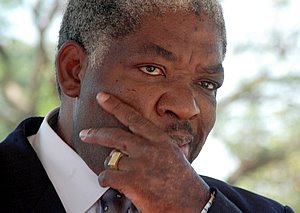
SOUTH AFRICA - RIVONIA — On 21 February 2009, an article authored by Gareth Moyo under the title: “Biti is not the best choice” published by ZimDaily.com allegedly based on comments made by Professor Jonathan Moyo (MP) to journalists in Harare raises some fundamental and foundational issues that are critical in informing the nation building process.
I should like to believe that Professor Moyo may not be the only one who has questioned the wisdom of appointing Hon. Biti as the Minister of Finance at this defining moment in Zimbabwe’s post-colonial history.
If Biti is the only one who is not the best choice then who is and by whose standards?
Who should be a Minister? What criteria should be used for assigning Ministerial duties?
After 29 years of control of the state by one political party led by one leader, it must be accepted that it becomes difficult to look at governance in isolation of President Mugabe’s known and predictable approach.
He has rightly or wrongly set the standards and it is, therefore, not unusual for people to expect new players to follow suit.
Independence brought with it sovereignty to the people of Zimbabwe. Civil rights were restored to all and a republican constitution was adopted conferring universal rights to all.
One of the arguments used in denying the majority of the population the right to vote during the colonial era was that the outcome would be unpredictable as people with no interests in a civilised society could not be trusted to make rational choices.
A responsible government under the colonial system could only emerge, therefore, if the right to vote was reserved for civilised people.
In all phases of colonial development in Zimbabwe a striking feature was the link between education and wealth to governance.
It was argued that educated and propertied blacks could be assimilated in the colonial system but the values informing the construction of the state could never be the values of the black majority who were perceived to be uncivilised.
It was argued that a colonial state could serve no purpose to a people who had no history of institution building. The colonial system was an interest based construction in which the colonialist never saw themselves as subservient to the English government.
Rhodesia emerged as a company owned by Cecil Rhodes stemming from a charter granted by the Crown. Under the charter, sovereignty over Rhodesia was transferred to a stock company with full governmental authority being vested in the company itself.
Although under the colonial system it was clear who the state was expected to serve, under the post-colonial system it has been a challenge to construct a new social contract that can produce outcomes that promote and protect a state that was never meant to be of value to non-income and propertied class of citizens.
Appreciating that the majority of the people in Zimbabwe are poor, rural and illiterate, the connection between the state and the majority of the people has been at best remote and academic.
The post-colonial constitutional democratic order vested sovereignty in the people, a majority of whom had no defined interest in the state resulting in state actors assuming the same role as colonial actors.
Under this system, citizens were responsible for electing parliamentary representatives as well as the President (since 1987). The President would then choose his cabinet from among the elected parliamentary representatives as well being able to nominate a designated number from outside the elected representatives.
To the extent that the selection of the President has less to do with his/her intellectual competence and capacity, it means that citizens who have the right to choose have nothing to base their choices on other than references to historical revolutionary struggles or promises.
It must be observed that citizens who are financially illiterate are inherently incapable of supervising their own representatives in the state.
Democracy with no accountability is nothing more than tyranny. The appointment of Biti cannot, therefore, be shocking as there is no constitutional impediment to disqualify him. In fact, there is no requirement that a Minister be an expert in the field that he is expected to preside over.
Ministers are after all political players who are selected by citizens using the same yardstick as that used in electing a President. No country has found a mechanism for selecting politicians and subsequently appointing them on merit.
The construction of a cabinet need not, therefore, be based on the criteria suggested by Professor Moyo. It is also important to appreciate the role of Ministers in the state. Should Ministers be technocrats?
I do not believe that it is necessary for Ministers to be experts rather it should be the responsibility of citizens to ensure that they participate in the governance process by using the different branches of the state to ensure that there are checks and balances.
What has been lacking during the last 29 years is the vigilance of citizens in holding their government accountable.
Given the role and place of President Mugabe in the history of Zimbabwe and his personality, it has not been possible for citizens to exercise any control over the state resulting in Ministers being only accountable to the President. Even parliament’s oversight role has not been of relevance in the post-colonial state.
Given Prof Moyo’s close relationship with Governor Gono, his alleged criticism of Hon Biti’s appointment is understandable. Why would MDC be expected to behave differently from ZANU-PF? If President Mugabe has the prerogative to appoint his Ministers; then it not clear why Prime Minister Tsvangirai; should not have the same right.
Any change in political behaviour has to be a consequence of citizen action. If Zimbabweans want the system to change then it behoves on them to change their attitude towards the state and the obligations to be the change they want to see.
No politicians will have an incentive to change behaviour unless he/she knows there are consequences.
When Prof Moyo was in government, he was accountable to no one. Zimbabwe’s prospects will only be lifted up by the actions of citizens who out of self interest want their circumstances to change and less by the actions of state actors operating in a vacuum.
The state can only be viable if funded by income generated from the activities of citizens rather than from donations or external support.
What are important factors are not the skills or experience of Hon Biti but the courage of Zimbabweans to reclaim their future. It would have been more beneficial for Prof Moyo to suggest what he proposes as the options open to Zimbabwe rather than focusing on the qualifications of Biti.
The inclusive government will have to rely on the inputs of organised citizens rather than on the perspectives of well established cynics. Prof Moyo has made the point that ZANU-PF nominees to cabinet are deadwood as described by President Mugabe.
What is different now is that there is a framework that has not existed before where executive power is shared and Ministers now have to report to a power structure that is not monolithic.
This framework provides a unique window for citizens to channel their complaints to a broader constituency and also allows for the deadwood to be exposed much more easily than before where Ministers’ obligations were only to please President Mugabe.
The country needs the help of all to move forward. It is not necessary that the contribution be restricted to only serve the state. Citizens should use the new framework to build a new system of governance that relies less on the intellect of the state actors but on the interests of the people that the state is expected to serve.
###################################################
The following comments are owned by whomever posted them. ZimDaily is not responsible for what they say. Please keep your comments short and sweet. Obscene, tribalistic, racist, vulgar comments will be deleted.
(HTML Codes not allowed)











No comments:
Post a Comment